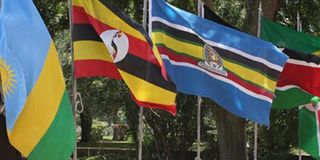Go slow on push for EAC single currency - expert

What you need to know:
- Mr Azevedo’ s caution on the single currency is in line with what Ms Christine Lagarde, the IMF managing director said in January 2017, when she was on a three-day visit to Uganda.
Kampala. East African Community (EAC) countries have been told to go slow on the push to have a single currency for the region if they cannot fix the basics of trading in the region.
In an interview with Daily Monitor, Mr Miguel Azevedo, the head of investment Banking for Africa at Citigroup, said the countries should focus on issues that boost East Africa as a trading bloc because a single currency may be hard to attain.
He said: “Common currency goes with a few other needs, which means some common policies like similar budget policies, inflation levels and taxation among others. These things are harder to get. Just look at Europe. We have been working on the single currency for decades.”
“What is doable and can create meaningful impact in the short term is creating a single market and I think it is getting there but governments need to be convinced that it is the way forward,” he added.
In 2013, the EAC countries agreed on a timeline of about 10 years to have achieved a common currency.
However, because the structures of the economies around the region differ, a common currency model has been noted to be risky. Mr Azevedo’s comments come with an understanding that for the EAC to be transformative, trade barriers and free movement of labour can help boost the region, especially the private sector to thrive.
He notes that the focus on developing infrastructure within the region by Kenya, Uganda, Rwanda and South Sudan will somewhat drive the growth the region needs. “You must create the conditions for people to have jobs. If anything is a priority here, it is infrastructure because with the infrastructure you can move goods and people around. Having a plant in Kampala is not less competitive than having a plant in Mombasa. The plant in Kampala can supply the whole EAC market,” he added.
He further points out that for investors – outside Africa – looking for companies where they can place some equity, the preference is for those that have an outlook towards the region because it is a much larger market.
“Companies are focusing more on businesses that have a regional outlook to investment. This is because the EAC is a much larger market. I think the perspective of people from the outside; people like to see East Africa as a region. It is very different if you talk about a population of 150 million consumers versus 35 million consumers. These are different countries but businesswise, I think people will look at regional opportunities other than country opportunities,” he added.
A recent report presented to the EAC Council of Ministers indicated that the region still had high levels of Non-Tariff Barriers that were restricting the free movement of goods and labour. This is considered a constraint in developing the EAC into a single market.
Mr Azevedo’ s caution on the single currency is in line with what Ms Christine Lagarde, the IMF managing director said in January 2017, when she was on a three-day visit to Uganda.
“Coming from the European Union and a country that is part of the Eurozone, I would certainly stress that making haste slowly is probably the best way to go and consolidate one step at a time, to make sure that the steps you have taken are actually solid, sustainable and will take you to the next level,” Ms Lagarde said at the time.




